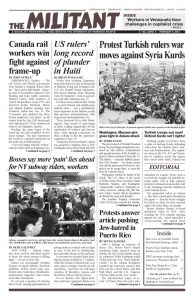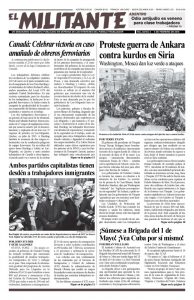Workers in Venezuela face growing challenges in the midst of the deepening capitalist economic crisis there, exacerbated by sanctions and other attacks from Washington. Oil production — the country’s main source of hard currency — is at a 28-year low. Runaway inflation and a lack of paper money, factory closings, rampant crime and black market profiteers combine to make the grind of daily life more difficult.
Washington continues to challenge Venezuelan sovereignty and to tighten the screws on the government of President Nicolás Maduro. On Jan. 5 the U.S. Treasury Department imposed sanctions on four more Venezuelan officials.
And the Venezuelan government faces the continual squeeze of meeting the payments on its foreign debt, estimated to be as much as $150 billion. The interest on some of the bonds tops 30 percent.
Maduro took office after the 2013 death of Hugo Chávez. He continued on the course set by Chávez of seeking a “third way” — sometimes referred to as 21st Century Socialism or the Bolivarian Revolution — that explicitly rejected following the example of Cuba’s socialist revolution. Instead they’ve sought to administer capitalist economic relations, not overturn them, and promote social welfare programs and charity instead of organizing workers to take control of production and political power. But administering dog-eat-dog capitalism in favor of the working class is impossible.
When capitalists can’t make what they consider high enough profits, they just stop production or seek alternative markets. Corruption, theft and shortages are endemic in Venezuela.
Working people face an annual inflation of more than 2,000 percent, the highest in the world.
“It’s true, the prices go up every day,” Ana Graciela Barrios told the Militant by phone from Caracas Jan. 23. “The wages don’t keep up. Really, daily life is very complicated.” Barrios works with a community group in the San Agustín del Sur working-class neighborhood bringing food directly from farmers.
“People are eating fewer meals and less protein. In the popular sectors, chicken, beef, is almost nonexistent,” Barrios said.
A government subsidized food basket, distributed in working-class and poorer neighborhoods, helps people survive, but lasts a couple of weeks at most, she said. “And money is scarce. A lot of things you can buy with your bank or food cards, but for the bus you have to have cash. For those who live outside Caracas and commute here for work, that takes a large part of their income.”
In an effort to slow the inflation, Maduro has imposed price controls and limited the amount of money that can be taken out of the bank each day. He ordered stores to roll back prices to December levels, with little impact. Soon after, many goods simply disappeared onto the black market.
The recent increase in oil prices — the biggest cash crop in Venezuela — to $70 per barrel worldwide won’t give a big boost to the government’s finances because of a steep drop in production.
Oil facilities have deteriorated, as the government decapitalized the industry and used the cash for other purposes. It skimped on maintenance and investment, causing a drastic decline in production — a 29 percent drop last year.
In November Maduro appointed Gen. Manuel Quevedo to head the oil company, ostensibly to fight corruption. And since last August over 50 managers have been arrested for graft. But these top-down, administrative measures have done nothing to reverse the decline.
In January, many oil workers protested demanding government action.
“We are working with just our fingernails” to keep oil production going, Sinutrapetrol union president Fabricio Mejias said, flanked by dozens of shop stewards Jan. 11 in Puerto la Cruz.
The day before, workers at the Petrocedeño division of the state oil company PDVSA in Anzoategui also posted a video on the internet. “There are no guarimberos [reactionary thugs] here, just flesh-and-blood workers who are making their best efforts daily to maintain the plant’s production,” one worker representative says in the video.
“But it has to be said that we are getting starvation wages,” he added. There is a shortage of toilet paper, safety equipment and food in the company cafeteria is poor. Wages are so low they are not enough to buy a kilo of cheese.
Carlos Oyoque, a leader of the union’s Che Guevara council there, said many workers are quitting. “But our homeland runs through our blood,” he said. “Many people still believe that we can raise up the country and move forward.” The workers are demanding a meeting with Maduro and Quevedo to negotiate a new union contract.
Union Secretary General Johnny Linares at the government-owned Venezuela Cement Co. in Puerto Ordaz told El Correo del Caroní that their contract ran out in 2009 and they earn only minimum wage. “By the end of the month there is little that we can buy,” he said. Workers survive by selling or trading bags of cement they are given every month.
Solidarity from Cuba
Washington hates the Venezuelan government and people, because they’ve aided Cuba, and the U.S. rulers fear workers and farmers there could follow the example of the Cuban Revolution.
The Cuban people continue to offer solidarity to Venezuela. There are more than 20,000 Cuban internationalist volunteers there, many providing medical care, often in the poorest and hardest to reach parts of the country. They treated nearly 6 million patients last year.
The Socialist Workers Party joins Cuba in opposing all of Washington’s moves to interfere with Venezuelan sovereignty. U.S. Hands off Venezuela!

